One of life’s ultimate treats is to spend a day out in the Okavango Delta in Botswana, travelling the waterways in a traditional dug-out mokoro with a private guide who will pole you in gentle solitude and then take you for a game walk on the animal-rich islands while pointing out signs of the wild. It is one of the most relaxing and invigorating ways to spend a day. At least it should be.
It was this activity that a young British couple, Rob and Liz, opted for when they were staying at a lodge on the Boro river in the heart of the Delta. They were enticed by the prospect of being gently poled through the crystal-clear channels with only the soft splashing of the pole and the chirping of the birds to break the peaceful silence. Their poler, they understood, would stop from time to time to point out game or to allow them to photograph the colourful reed frogs or the profuse and beautiful day lilies.
The outward journey did not disappoint. After a few hours of bliss, the guide landed the mokoro on the mainland and suggested that it was time for a game walk. They had a productive game experience, during which time they saw elephant, giraffe, zebra, buffalo, a warthog family and a number of antelope species. They were also thrilled when the guide pointed out tracks of a leopard that had passed early in the morning and the signs of a hyaena kill that was fresh enough to have happened during the night. It was three hours before they returned to the mokoro where they enjoyed a packed lunch, after which the guide lay down in the mokoro, pulled his cap over his eyes and promptly fell asleep.
The couple, not wanting to waste a moment of their short stay in the bush, climbed a nearby termite mound from where they spotted a herd of zebra peacefully grazing on the adjacent floodplain. Pumped by their morning’s adventures they decided to get closer to the zebras to take some good photos. As they approached the herd the zebras moved away slowly to maintain the same safe distance, so the couple stealthily followed, totally focused on their target. Eventually the zebras tired of their amateur stalkers and trotted off disdainfully into the distance. The couple, disappointed that they had not managed to get close enough to the zebras for that special shot that they were looking for, gazed around for a new target and saw a small herd of tsessebe foraging in the middle of a distant floodplain. They set off once again but soon learnt that they were trying to sneak up on one of Africa’s fastest antelopes, who loped off rapidly as soon as they caught sight of the young Brits.
The youngsters realised that it was time to head back to the mokoro. They were thirsty as they had not thought to take water with them and so gazed around them for the best route back, but everything appeared the same wherever they looked. Open grass plains fringed by similar looking stands of trees greeted their gaze in every direction. They had no idea which way to go. After an earnest discussion, Liz wanted to strike west while Rob thought that they should go north. They compromised on a north-westerly direction. The sun was overhead so they figured that they must have followed the zebra for at least two hours, but because they were going stealthily, it should not take more than twenty minutes to get back to the guide and his full cooler of drinks. They both looked forward to a cold beer or two while they were being poled back to the lodge. Perhaps they could even find a place safe from crocodiles where they could take a cooling dip.
After an hour of walking in the midday heat, they realised that they had no clue where the mokoro was and so they started calling in case they were within earshot of their guide. Ten minutes later they gave up and sat down in the shade of a tree to plan a new strategy.
In the meantime, the guide had woken and realised that the youngsters were not around the mokoro. He smiled to himself. The young lovers had obviously sneaked off to find a private, romantic spot, so he made a fire to boil up some water for tea. After he had finished his tea and packed everything back into the mokoro he realised that it was time that they should start their journey back to the camp, so he called out for his guests but had no reply, so he went to look for them. He found their tracks and then those of the zebra and realised what had happened, but then he lost his charges’ tracks over some hard ground and decided to follow the zebra. When he found the spot where they had trotted off, he scouted for the couple’s tracks but found no trace of them, so he headed back to the mokoro in the hope that they had returned. As it was, they would still be on the water at dusk when the hippos started moving along the channels on their way to feed. That was the most dangerous time for those in a mokoro.
When he reached the mokoro there was still no sign of them, so he called a final time and decided to head back to the lodge to report his missing guests.
Meanwhile, the youngsters had struck upon a plan. There were planes passing overhead regularly. Surely if they could make a smoky fire, it would attract the pilot’s attention, who would be compelled to investigate. Rob smoked and so had a lighter on him and they quickly gathered some dry grass and twigs together which readily caught alight and burnt merrily but gave off precious little smoke. Rob had a brainwave. If Liz burnt her clothes surely that would give off enough smoke for a pilot to see. So, Liz burnt all her clothes except her shoes. Of course, no pilot noticed the paltry amount of smoke her summer clothing offered up. Now, excuse me if you will. I can’t possibly think what his true motive was, to render his girlfriend naked and even more defenceless in the bush while he retained his clothes. It has always struck me as a masterpiece of ingenuity but try as I might I have never found a woman who was prepared to burn her clothes.
As dark closed in, the exhausted, parched, hungry, but mostly terrified couple decided to spend the night in a tree, so they climbed to the relative safety of some sturdy boughs to which they clung all night, mindful of their guide’s tales of leopards stalking sleeping baboons as they slept in trees.
The night air cooled and the sound of distant lions roaring their presence reminded Liz that she was naked and afraid in the African wilds. Then from just beneath their tree a hyaena whooped. Perhaps it had smelt them, Liz conjectured? Can hyaenas climb trees? she wondered. Liz shivered from both cold and fear.
Finally, after a long and sleepless night, the sky lightened, and they felt safe to descend from their arboreal perch and not having anything to eat or drink they struck off again hoping to find some sign of humanity. They walked all day but found nothing of value save for a small grey pool, which they slurped from gleefully on all fours, ignoring the strong smell of elephant urine. With their stomachs at bursting point Liz, who was turning a bright shade of carmine from the beating sun, covered her body with the grey mud. The mud pack helped for a while to soothe both her fiery skin and her scratches where thorns had tugged at her skin, so she was grateful when the sun started to dip into the dusty sky. Late in the afternoon they excitedly found a small, seldom used vehicle track and decided to climb a nearby tree for the night, but only after hauling logs across the track to stop a passing vehicle.
My close friend, John Bulger, had spent the better part of a decade studying a baboon troop on a remote, unutterably beautiful island in the Okavango. Bobby-John, as he was renamed after the Afrikaans name for baboon – bobbejaan – by his artistic girlfriend Julia Cairns, had a working day that consisted of waking up to the early morning birdcalls which frankly, with the cacophony of robins, francolins, babblers and all 375 other species that visit Baboon Island, was unavoidable. Bobby-John would have a cup of black coffee and set out to join his primate family. In the time that he spent out there, he learned more about the interaction of baboons than, well frankly, I ever expected anyone to ever want to know. He recorded their social interactions; what they ate, who got to eat first and who got to mate with whom. The last bit of information came in volumes of such proportions that I started to wonder if Bobby-John had spent too many lonely hours watching one of man’s closest relatives go about their social mating business. 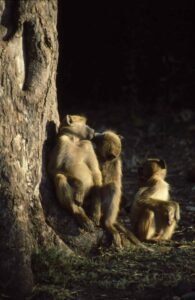
In those days Bobby-John would have a few evening beers to enhance the joy of living in paradise and so always had a healthy stock of Castle Lager. Julia, who used to visit him and often stayed for long periods at a time while she painted various angles of paradise, also needed to go to the big cities to sell her works of art or to Maun to resupply their rustic camp, leaving Bobby-John alone. It was on one of these occasions when Julia was away that Bobby-John needed to return to Maun for supplies. He threw a carry pack of beers into a cooler-box for the trip, checked the diesel level of his rusty cruiser and trundled down the track that linked him to civilisation. He was in a general road daze, probably thinking of his beloved baboons and hardly noticed that the track seemed to have rather more trees laid across it than the elephants generally manage to do.
What did suddenly startle him into the present was the sight of a totally naked young woman running towards him, waving her arms and screaming. In her wake followed a fully dressed youthful man who was also shouting and waving his arms about. It occurred to Bobby-John to stop out of polite interest and ask after their somewhat unusual condition.
Having heard their story, he invited them to sit in the back of his pick-up and to help themselves to his beer. After two days of no food and only some elephant urine to drink, two beers had their effect on the couple. The third beer was perhaps one too many…
Maun was a frontier town in those days, used to many strange sights, but I doubt that anyone was prepared for the nude, wasted, sunburnt young woman who climbed down from the back of the vehicle and started hugging everyone in sight.
While this story had a happy ending, it could so easily have turned out differently had Bobby-John not gone to town that day. Although they had set out on a north-westerly direction, Rob and Liz had, in fact, turned themselves around and were heading due east when they finally struck upon Bobby-John’s track. If they had continued in that direction, they would have had a two day walk to the nearest water and there is little doubt that Liz would have succumbed to dehydration and severe sunstroke before she reached the Santantadibi river.

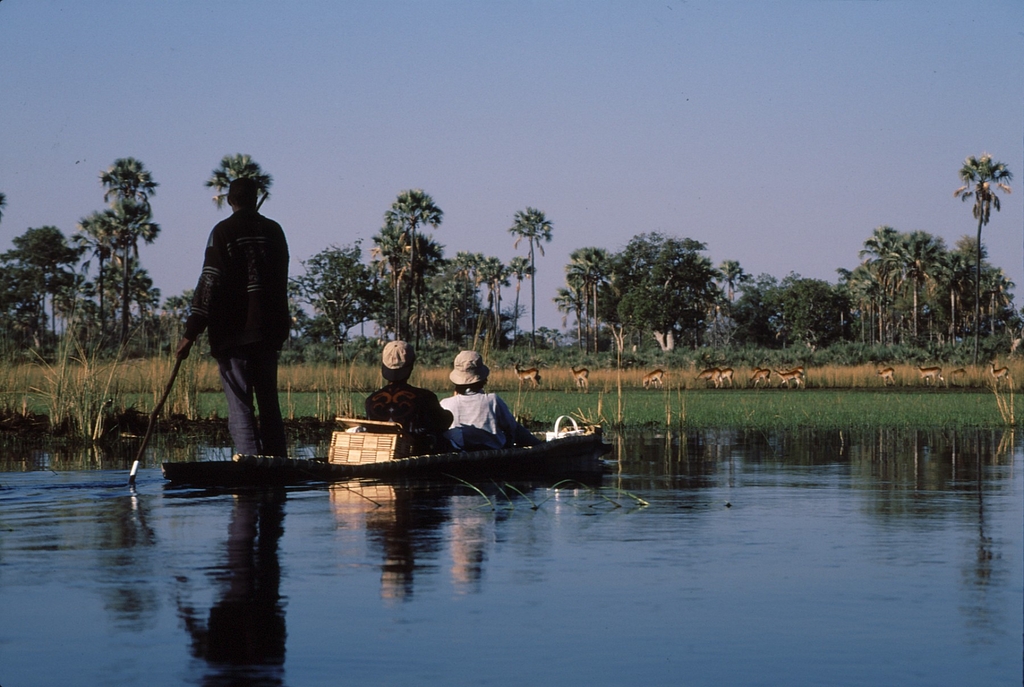
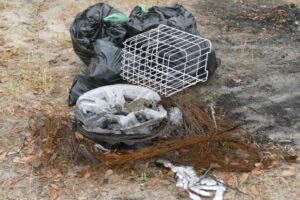
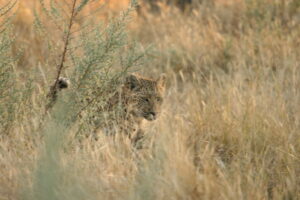
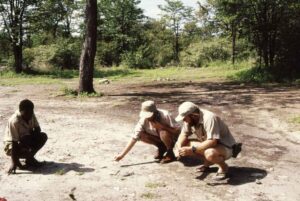
This phrase is simply matchless :), it is pleasant to me)))